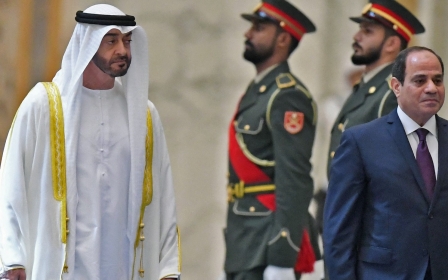Egypt crisis: Sisi's mega projects are no substitute for feeding the people

Egypt's population clock this month reached 104.5 million, up from 81.4 million in 2011, as estimated by the Central Agency for Public Mobilization and Statistics. It is with this figure in mind that we can reflect on the country's deepening economic crisis and the ongoing attempts to draw similarities between Egypt and Lebanon.
On the 12th anniversary of the 25 January revolution, what has happened to the simple, yet revolutionary slogan: "Bread, freedom and social justice"?
Historically, the price of bread cannot be played down, given its prominence in the basic food basket. This is particularly relevant in Egypt, where "aish" (bread) literally translates to "life". The price of bread in the country has been a sensitive issue since the 1977 "bread riots", when Anwar Sadat, then president, was forced to roll back a decision to cut bread subsidies.
From a social perspective, public investment cannot shy away from securing food for those who are poor and vulnerable
Today, with the market price of bread soaring by around 50 percent amid supply-chain disruptions caused by the war in Ukraine, the Egyptian government has rolled out alternative bread subsidy schemes, such as the provision of new prepaid cards to enable those who don't hold ration cards to buy bread at discounted prices.
Yet, despite the importance of bread to every household, President Abdel Fattah el-Sisi promised much more when he took office nine years ago. In 2014, Sisi vowed that the "great people [of Egypt would] reap the fruits of two revolutions". A discourse analysis from the perspective of the owner of Egypt's Vision 2030 suggests that Sisi believes the mega-projects undertaken since he took power will pave the way for the country's "comprehensive renaissance".
Stay informed with MEE's newsletters
Sign up to get the latest alerts, insights and analysis, starting with Turkey Unpacked
To Sisi, these mega-projects will lead Egypt on a different economic path - and his vision seems unaltered, despite limited fiscal space, with the gross public debt hovering at 88 percent and budget deficit at minus 7.1 percent, according to the International Monetary Fund (IMF). Sisi has repeatedly defended these projects in the context of building Egypt's future.
Complex relationship
The relationship between mega-projects, employment generation and inclusive growth is complex to measure. According to the McKinsey consulting firm, infrastructure mega-projects tend to go poorly when there is "overoptimism and overcomplexity", and amid "poor justification and need for the project".
As for Egypt's mega-projects, the IMF noted in a report this month that "expenditure on public projects, including national investment projects, contributed to current account pressures … The authorities' commitment to managing the implementation of public investment projects in a manner consistent with the macroeconomic policy mix is critical".
At the same time, a more differentiated analysis of the role of these infrastructure mega-projects is useful in the context of Egypt today. As noted in an article in the European Journal of Development Research, mega-projects can play a symbolic role in "future-oriented development politics as objects of imagination, vision, and hope".
But what is puzzling in the case of Egypt's mega-projects is that they have seemed to reinforce the economic role of the army at the expense of the private sector, and this seems difficult to view as "future-oriented". This issue has also drawn criticism from the IMF, via toned-down concepts such as the "outsized role of the state" and "uneven playing field".
From a social perspective, public investment cannot shy away from securing food for those who are poor and vulnerable. A future economic vision that does not give priority to food security does not seem very visionary.
Egypt cannot continue to request loans to feed its people. Last June, the World Bank approved a $500m loan to support Egypt's efforts "to ensure that poor and vulnerable households have uninterrupted access to bread", along with reforms to food security policies. These needs will only grow as the population continues to increase.
Structural reforms
While it is difficult to answer where Egypt is headed, one is compelled to ask this question nonetheless. Egypt's population is almost one quarter of the population of the entire Arab world, and its future outlook will largely shape that of the region.
The recent trend of comparing Lebanon's hyperinflation and its de facto currency float with Egypt's recent move to a durable flexible exchange rate is understandable, but such comparisons don't really hold beyond the headlines. How can one compare a weak state with a visible state? The share of public-sector employment has reached 26 percent in Egypt, compared with 13 percent in Lebanon.
Moreover, the Lebanese state as a service provider plays a meagre role compared with the role of Egypt's state, and the diverse economic role of its army. The dire living conditions in Lebanon have been slightly absorbed by the flow of remittances, which make up 38 percent of GDP - a figure that some observers say is an underestimate. In Egypt, staple security can only be provided in-house, as remittances contributed just 6.7 percent of GDP in 2020.
The structural reforms to which Egypt is committing signal that the country is moving towards a different role for the state. The IMF says these reforms aim to reduce the "state footprint", level the playing field, facilitate private-sector growth and tackle corruption.
And here, let's all agree that simply downsizing the state by offering shares in state-owned companies and/or extending contracts to connected business elites will only result in reducing the state footprint on paper. What is needed is a mega-vision that realises that for a country the size of Egypt, an economic model centred around "feeding the people" will not necessarily offer a sufficient answer - but it could provide enough insights to revisit the present roadmap.
The views expressed in this article belong to the author and do not necessarily reflect the editorial policy of Middle East Eye.
Middle East Eye delivers independent and unrivalled coverage and analysis of the Middle East, North Africa and beyond. To learn more about republishing this content and the associated fees, please fill out this form. More about MEE can be found here.







